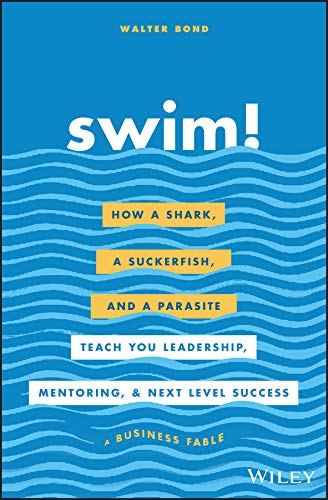Our chief want in life is somebody who will make us do what we can. – Ralph Waldo Emerson
In Swim!: How a Shark, a Suckerfish, and a Parasite Teach You Leadership, Mentoring, and Next Level Success, American former professional basketball player, and peak performance speaker Walter Bond writes about timeless lessons that we can learn from Sharks, Suckerfishes and parasites. How to develop a shark mentality, live with the suckerfishes and manage the parasites in our lives.
Great leaders influence; bad leaders rule. A shark should recognize a suckerfish’s weaknesses or shortcomings and have a heart to help them grow and improve, knowing they are valuable.
At the core of Walter’s teaching is the sacred six:
- Sharks never stop moving forward.
- Sharks never look down; they always look up.
- Sharks are always curious and always learning.
- Sharks always respect their environment and recognize other sharks.
- Sharks are always flexible.
- Sharks always elevate their suckerfish to new levels.
“When we live in harmony with the Sacred Six, we are truly swimming like sharks. Sharks just don’t swim, they SWIM.
Sharks: Why do you think they don’t go after each other?
They’re predators. They eat meat. They are surrounded by meat that can’t get away. Why isn’t it a bloodbath?
They rarely attack each other because they’re all the same. Sharks recognize and respect other sharks. You don’t attack someone you respect. They may not all be the same species, but they know that they are all sharks. There is enough room in there for all of them to be sharks without being a threat to each other,
Failing Forward
The first thing you need to know about being a shark is that sharks never stop moving forward. They are in constant motion, or they die. If they go backward, they drown. It’s called failing forward. If you live in the past, you’ll never improve your future.
Sharks never look down; they always look up. Your attitude is the only thing that can stop you. Stay positive, no matter what! Sharks don’t act like common fish, because they are different—they are sharks. Sharks are curious; they are always paying attention and are always learning.
Sharks respect their environment and recognize and respect other sharks.
The Sacred Six
- Never stop moving means constantly seeking balance and progress in all areas of your life and not stopping until you reach your goals. It’s not moving forward with your own agenda while leaving everyone else in your life to fend for themselves
- Never stop moving means waking up every day determined to progress further than the day before, even if you’re worn out or tired or the current is too strong.
- Sharks never stop their movement. The constant forward movement literally gives sharks life.
- And when you’re a shark, you need progress and growth to feel alive. If your life isn’t growing and improving, something is wrong. You need to go back and check yourself against the Sacred Six.
Sharks never swim backward
All the sharks were swimming forward, with direction and purpose. They didn’t zig and zag through the water, and they never went backward. They’re actually not capable of swimming backward; they would drown if they did.
As sharks, we must be focused on progress and forward movement. We learn from our mistakes and work hard not to repeat them. You don’t make mistakes twice, because the second time you do it, it’s a choice. Once we learn a lesson we don’t revert to our old ways; we don’t go back to who we used to be.
Sharks never, I mean never, swim backward.
Sharks are made of cartilage.
Sharks are made of cartilage. All cartilage. Like this flabby part of your ear or the tip of your nose. Most other fish have skeletons made of bone. The fact that sharks are made of cartilage makes them flexible and adaptable.
Some sharks can survive in both salt and freshwater. Cartilage is lighter than bone, so sharks can change direction swiftly and efficiently, unlike people or fish. Sometimes making a fast change or any change at all is the most difficult thing for people to do.
Sharks never stop swimming
How many people do you know who are stagnant after a mistake or just stagnant people period? You can overcome any mistake if you don’t quit. Successful people aren’t perfect and they make mistakes, but they keep moving and outwork everyone, too. You can overwhelm a mistake with hard work.
Sharks are curious and are always learning.
They didn’t get what they wanted by chance. They went after it. They were hyperfocused on their surroundings so that at the first smell of blood in the water, the first opportunity, they were tuned in. They didn’t depend on the leftovers of others, or for another shark to bring them food. They knew that if they wanted it, they’d have to go get it.
Be Bold
If you are brave enough, you can even swim with sharks. You see it on TV all the time. Shark experts will tell you, when sharks bite a human it’s because they see this strange creature flailing in the water and they bite it just to see what it is because they are curious by nature, but they normally spit it right out—because we taste nasty to them. I’ve even heard crazy stories about experienced ocean swimmers punching sharks in the face and the shark leaving them alone out of respect.
Sharks have a strong sense of smell
Sharks know where to hunt because they have been specifically designed with senses that help them not only survive, but thrive. A shark has a keen sense of hearing, and their sense of smell is impeccable. Put a drop of blood in twenty-five gallons of water and the shark will be able to pinpoint it. They have been given everything they need to be successful, they just need to use what they have.
Facing the fear is faster
Facing your fear is faster. If you had turned toward familiar, you wouldn’t be here yet. There’s a bridge and a lighted path that way, but it’s much longer. The fear path is much faster but has some obstacles. In life, you get somewhere much faster if you feel the fear and take action anyway. Facing the fear is always a faster way to get where you’re trying to go than sticking with what is familiar.
The Suckerfish
The remora, the suckerfish, attaches itself to the host, typically a shark. The shark provides transportation for the suckerfish and a constant flow of water over its gills that keep it alive.
The suckerfish isn’t getting a free ride, and the shark benefits in a lot of ways by keeping it around. Suckerfish add value to the shark, but, most importantly, the suckerfish keep the shark alive. The shark provides protection, and the suckerfish eats the bacteria and parasites off the shark. Sharks are alpha, but they also recognize a mutually beneficial relationship when they see one, and they take advantage of it.
A suckerfish knows it can thrive by attaching itself to a shark. It knows it is protected, it is fed, it’s safe. And it benefits the shark, too.
Mutually beneficial relationship with the shark
The suckerfish and the shark have a mutually beneficial relationship. The suckerfish attaches to the shark and the shark takes it wherever it goes; suckerfish get free rides in the ocean and can conserve energy. Some remora fish can stay attached for as long as three months. The shark takes care of the suckerfish. Suckerfish benefit from the shark’s protection and free rides in the ocean, and they get to eat the scraps of each kill.
But why do sharks allow this? What are the benefits to them?
Because parasites are also always trying to connect to a host. So the suckerfish eats the parasites that can be found on the shark’s skin. If a parasite gets into a shark’s gills it can affect its breathing or kill it. If the parasite gets into the shark’s nostril it can attack its brain. No matter how powerful a shark is, a shark knows it needs help and good teammates to thrive.
Be careful who you allow in your life
Beware of who you allow to connect to you. Sharks will take as many suckerfish as they can with them. It’s a win-win-win. People are no different—who we connect with in life can make or break us.
Beware of who you allow to connect to you … who we connect with in life can make or break us.
Parasites
Parasites are nasty. Nasty, nasty. They’re an entire species of microscopic nastiness. All they do is spread death and disease. This was, without a doubt, my least favorite lesson to learn. Very important, but very different from the trips to the aquarium or a day out on the boat.
That tiny thing is responsible for taking down huge marine animals, like sharks and rays. ‘It’s a scuticociliate, a subclass of ciliates. They’re free-moving ocean organisms that operate as opportunistic parasites. They cause a common fish disease called scuticociliatosis, where tissue-eating cilia consume the blood, skin, and internal organs of their infected host.
They’re small, but they are responsible for the downfall of animals much bigger than they are. They weasel their way in and feed off an unsuspecting shark, slowly draining its energy, health, and ability. They need the shark to survive until they drains it of all its resources, slowly contributing to its demise.
The Parasites in your life
A parasite is anyone in your life who takes from you but does not add value. They are not interested in using their strengths to benefit you; they are solely interested in their own survival, even if it means causing damage to you or others. And they can be hard to get rid of. Parasites know that their best chance of survival is finding a host to attach to, and once they get settled, they get to work in bringing the host down.
There is hope for them
People who are parasites in your life are not bound to be parasites forever. They, unlike the ocean species, are capable of thought and reason and education, and change. The same goes for sharks and suckerfish. Just because you’re one now doesn’t mean you’ll be one forever. It’s all very fluid and should be evaluated on a case-by-case basis.
“Parasites just need to be shown how their attitude and their actions impact others…. Some parasites know that’s what they are and are fine with it. They have no intention of changing or bettering themselves or their company.”
Managing Sharks, Suckerfishes, and Parasites
Managing Sharks
We all have good qualities, so we should always show respect to our peers. By giving sharks freedom to move throughout your life or business, you add strength to your team. Remember how the sharks in the tank at the aquarium just swam around together without killing each other? This is how you know you’re surrounded by sharks. Everyone knows their role and their value and does not feel threatened or intimidated by greatness.
Managing Suckerfishes
The suckerfish are managed in a separate way. They often crave direction and guidance, but once they find their spot, they’re a vital part of the team and become sharks too, with the right support. They are eager to learn and need to be put in situations where they can connect with a shark and be mentored. They want to go places but are aware that they need someone else to help them get there. These people work best when they are challenged. They need their questions met with patience, and they work best when their loyalty and work ethic are acknowledged.
Great leaders influence; bad leaders rule. A shark should recognize a suckerfish’s weaknesses or shortcomings and have a heart to help them grow and improve, knowing they are valuable.
Managing Parasites
Our mission in managing them is not to destroy them; instead, managing parasites means being honest in your assessment, clear about your boundaries and expectations, and open-minded enough to offer a second chance. Parasites often aren’t aware of how their behavior impacts others or the team and simply need to be called out in love about what they have to do to change.
As we know, parasites are often a result of a broken or a messy past that has robbed them of their ability to integrate successfully into a social or professional setting. Taking the time to get to know why parasites act the way they do is a first step in helping them change their ways. Parasitic people don’t trust others, and there could be a good reason for that. That’s why there is hope for a parasite—most people who act that way do it out of pain. Remember, hurt people hurt people.
But we know that parasites can quickly take down their host and that they are known for spreading death and disease everywhere they go, so they can’t be left on their own. They can’t be shoved in a back office or ignored in order to keep the peace. Parasitic-type people must be handled swiftly in order to maintain the health and balance of the team. They’re hard to get rid of though, right? So they won’t go without a fight.
Your goal is not to fire every parasite and send them to suck the time, energy, and resources from another host; it is to help them evolve into a species that not only gives them a better chance to thrive but gives the company a better chance to thrive as well. However, it is important to know when enough is enough and to be proactive in removing a parasite that has no intention of changing.
All the Best in your quest to get Better. Don’t Settle: Live with Passion.



1 Comment
Pingback: 100 Books Reading Challenge 2021 | Lanre Dahunsi